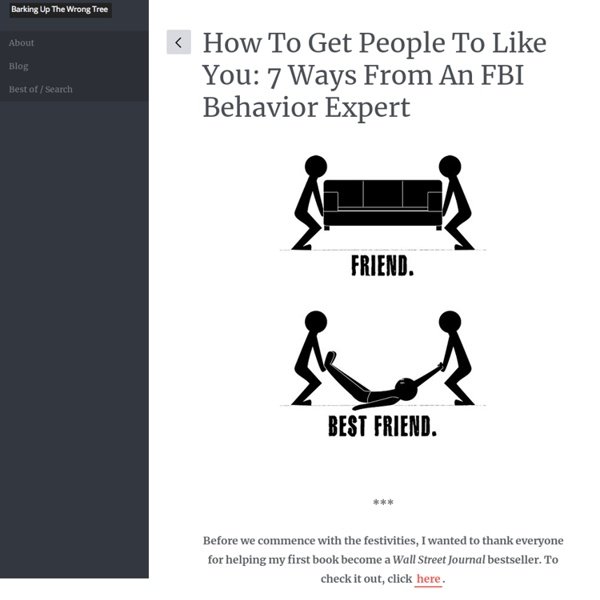How Technology Disrupted The Truth
One Monday morning last September, Britain woke to a depraved news story. The prime minister, David Cameron, had committed an “obscene act with a dead pig’s head”, according to the Daily Mail. “A distinguished Oxford contemporary claims Cameron once took part in an outrageous initiation ceremony at a Piers Gaveston event, involving a dead pig,” the paper reported.
Afraid of Love: 2 Fears That Keep People Single
Could you possibly be afraid of falling in love? Watch out for these telltale signs, and finally free yourself to attract a genuine, loving relationship. Fear is a funny thing.
How To Make People Like You: 6 Science-Based Conversation Hacks
So you want to know how to make people like you? It’s easier than you think. A while back I posted about how to master conversation skills. Here are 6 more research-backed tips:
On How to Disagree
We live in a world saturated with disagreement. People are at odds about pretty much everything from when to order a taxi, go out to dinner to whether there should be a caliphate; from the kind of orbit the International Space Station should assume; the right way to cook lasagna to whether Hungary is in Eastern or Central Europe, and how long a child should be allowed to play Minecraft on a Saturday morning. While disagreement can be civilised, interesting and productive, it is much too frequently a powerful source of misery: we get enraged and bewildered; we are appalled at the views of others and feel intensely bothered by them; we feel defeated, hopeless and lonely; we agonise, rehearse the conflict alone in our heads, worry, feel guilty, get upset… Disagreement is especially pressing now, because of certain large societal forces that have been building for the last couple of centuries. 1. Politics
Opinion: the ethics and effectiveness of nudging.
Since the publication of 2008’s Nudge by Richard Thaler and Cass Sunstein, policy ‘nudges’ have been in fashion, with smaller interventions aimed at altering public behaviour in a subtle manner being adopted by many governments, including in the UK. Frank Mols looked at this phenomenon in a recent journal article, and argues here that while nudges undoubtedly can be effective, their limitations must be kept in mind. This piece originally appeared on Democratic Audit. Governments across the globe –including the UK coalition government—appear to have fallen in love with behavioural economics, and the idea of nudging citizens towards better choices. Behavioural economics is a well-established strand of research in which psychological insights are used to question human’s ability to make ‘sound’ rational decisions. Behavioural economics was showcased once more in Richard Thaler and Cass Sunstein’s 2008 book Nudge: Improving Decisions about Health, Wealth, and Happiness.
Love is Not Enough
In 1967, John Lennon wrote a song called, “All You Need is Love.” He also beat both of his wives, abandoned one of his children, verbally abused his gay Jewish manager with homophobic and anti-semitic slurs, and once had a camera crew film him lying naked in his bed for an entire day. Thirty-five years later, Trent Reznor from Nine Inch Nails wrote a song called “Love is Not Enough.” Reznor, despite being famous for his shocking stage performances and his grotesque and disturbing videos, abstained from all drugs and alcohol, married one woman, had two children with her, and then cancelled entire albums and tours so that he could stay home and be a good husband and father. One of these two men had a clear and realistic understanding of love.
Why You Need to Take Care of the People Who Take Care of You
Some leaders believe that customers are their most important priority. Others believe their boss, their board, or their investors are their most important priority. Courtesy of iStock/Geber86 I’ve worked in companies where these philosophies were the cultural norm.
An Introvert's Guide to Networking
Every week, I get invited to another “must attend” business event sure to be full of important people who could affect my business. I know I should go, but it’s a chore. All too often, I end up standing in a corner clinging to the one person I know, feeling guilty that I’m not taking advantage of the situation. Recently, I attended a business women’s networking breakfast, held in a large warehouse near the waterfront. I marched through the door and collected my name tag to confront a roomful of 1,200 colorfully dressed, high-energy women chattering. Everyone appeared to be having a great time, making connections.



